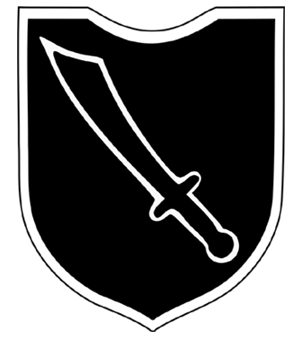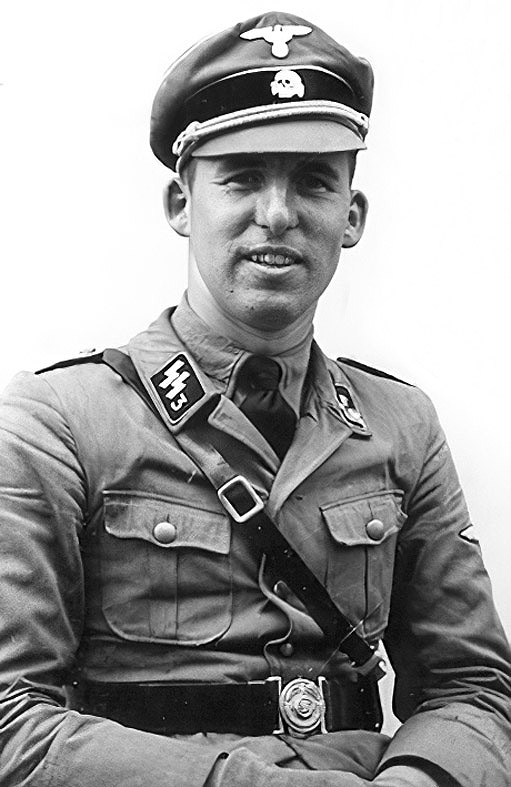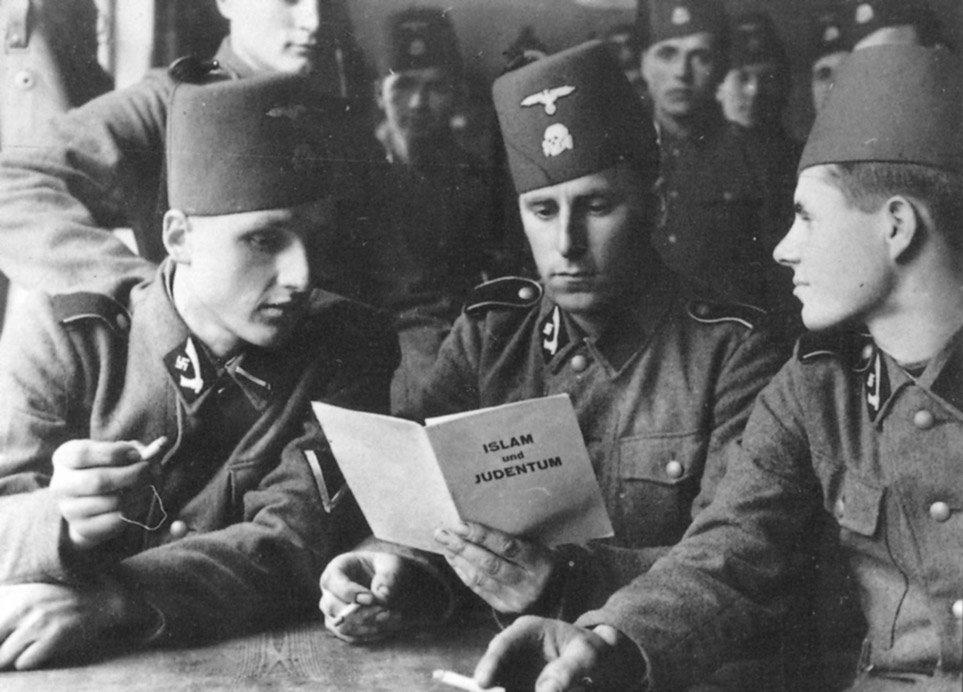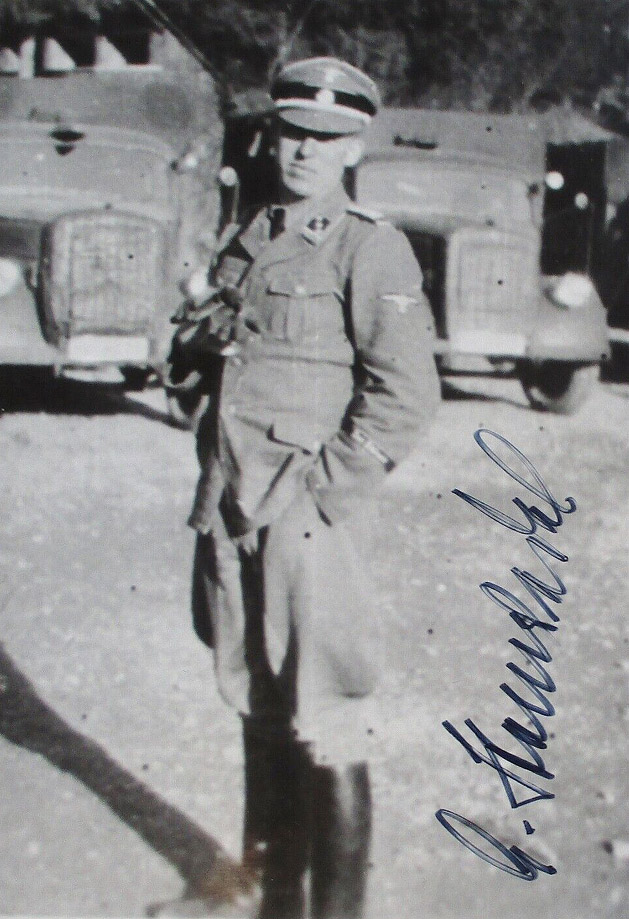

Interview with Albert Stenwedel, Knight's Cross winner and Battalion Commander of the 13. SS-Gebirgs Division Handschar, Hamburg, 1993.



Interview with Albert Stenwedel, Knight's Cross winner and Battalion Commander of the 13. SS-Gebirgs Division Handschar, Hamburg, 1993.

Thanks for letting me speak with you, I am told you knew Sepp Dietrich very well; can I ask what you remember of him?
Albert: That could take a while for me. I first met him when I was in the SSVT [SS-Verfügungstruppe (SS Dispositional Troops)] and was part of the LAH [Leibstandarte SS Adolf Hitler]. Sepp was the commander of the bodyguard and would work out of Lichterfelde; we often had to parade before him. He made it a point to meet and know every man in the LAH; only the best of the best were allowed in; he was a soldier's soldier. Reichsführer-SS Himmler also made many visits to us and knew many by first name. I was recommended for officer school, applied, and was accepted which put me in closer contact with our commander. I grew to respect him more and more as I rose up the leadership corps of the SS. He demanded of us our very best but was also forgiving of mistakes.
I remember during our graduation, he remarked that he only asked that we lead by example and be good leaders. He was always pleasant to talk to and was very intelligent; he had a mastery of history and was fascinated by battlefield errors that cost victory. Most importantly, he was like a father figure to the young men of the LAH; he was veteran of the first war and was much respected for that. He was a favorite of the Führer and I would see them joking with each other often. I once saw them compare how shiny their boots were, who had the shiniest won a bottle of spring water. He was one of the first Panzer men in the first war, he wore a very rare badge of the Panzers. Sepp was one of those rare men who you just knew would always be good during the war. There was a presence in the air when he was around that you could feel, he was fearless and often was at the front with forward units. He was an inspiration to us all when the times were tough, and he explained things as a matter of fact and did not hide the truth.
A gripe some comrades have made is they were angry that so many of the LAH was taken to be used to form other divisions or head another regiment. He was frank in stating we made up the core of a strong unit and we must be flexible in helping to create more, even if it means giving up our comfort. I saw many comrades get upset due to having entire staffs taken to form new units; he stepped in to calm things down. The LAH was the core that built up the rest of the Waffen-SS.
I was told you were a witness to the events of July 1934, what history calls the Röhm purge, can I ask you to explain?
Albert: I see, it is not something we speak of lightly. It was not just the purge of Röhm; it was of the entire SA staff. You see, it is hard to speak of this, but I know who you know, so I can share. I was an early member of the SS, and fully supported the SA; they are the ones who broke the Red grip on the cities. The SA was largely held together by former soldiers, and patriotic men who wanted to defeat Moscow. They endured much hardship due to the vicious nature of the Reds, their families attacked, homes attacked, and many gave their lives. The Reds would throw bricks, firebombs, and knives at them when they marched. The police could do little to help, even though they were mostly on our side. But there were also times when they attacked the Reds, and it was nice to see them get justice. The SA stood strong and fought back about the Red terror and in the end prevailed, as the German people saw through the lies of the Jewish media that protected them.
To tell you about the action you must first know that the SA lost its way after 1933, many of the men were corrupted. They carried very bad habits picked up from the Weimar era, into the National Socialist revolution. Some wanted to keep fighting to take full control and depose Hindenburg. Others wanted to have multiple leaders, not just one, as they felt everyone should lead. Some were Marxists who had infiltrated the SA and were secretly trying to push their ideology. A very tiny clique were sexual perverts who pushed their poison now that they had power. We uncovered child sex, homosexuality, and drug use. Some liked young prostitutes which were quite popular in Jewish circles, many were non-European, which was easy to exploit. Some of the first acts in 1933 were to end this madness once and for all. This did not sit well with these perverts and they started talking revolt. This went up the ladder all the way to Röhm.
Loyal SA men reported this to the Führer, who met with Reichsführer-SS Himmler to discuss the response. It was decided the SA leadership had to be purged of these sentiments, so mass arrests were made and those who were guilty of high treason and other offenses were executed. There was no room in National Socialist Germany for treason, fraud, and homosexuals. That is all that can be said of this incident, the guilty were punished, and the SS rose as the loyal arm of the party. The SA still stayed together but the core was removed and their efforts now became to help rebuild Germany, many going into the RAD and civil service. Many more went into the rebuilding of the military, becoming good soldiers, the more faithful came to the SS. Those of the LAH who helped tear down this revolt were given special daggers by Reichsführer-SS Himmler with a dedication on the back blade. These are prized pieces that are a solemn remembrance of helping to cleanse the movement.
I am told you are a bearer of the Knight's Cross, can I ask how you won this award?
Albert: Yes, I am afraid I was a very late winner, earning it in May of 1945 when the war was over. Before then I will tell you, I was with the 13. SS Division Handschar (Croatian, Bosnian) we had many names due to the mix of men who served. We fought in the Balkans against partisans and the Soviets in the end. There is a new war happening there now, over the same politics we tried to fix. During our retreats we were aware German units from the south had to move north. In one instance my men had to hold open a crossing on the Murr [the Murr is a river in Baden-Württemberg, Germany] to allow others to get across. We held the enemy long enough to accomplish this in spite of being vastly outmatched. We had few weapons and used mountain craft in some cases to make the enemy think every log, tree, and ditch was a trap. My battalion was very good at shooting and put fear in the enemy. I led these men, who were not Prussian soldiers of old, but still very effective.
This medal belongs to them as well. By this late stage of the war German units were outnumbered by as much as 10 to 1, and even though we gave a good account, we could not stop them. We had advanced weapons and better motivated men, yet it was too little to make a difference. I was welcomed in the circle of Knight's Cross bearers even though my award came very late and with no fanfare, as was normal practice. Before the end it was common to be awarded the Knight's Cross by the hand of the Fuhrer. You know that HIAG [Hilfsgemeinschaft auf Gegenseitigkeit der Angehörigen der ehemaligen Waffen-SS (Mutual Aid Association of Former Waffen-SS Members)] and others sponsor reunions for the bearers of this and other high awards. You must become an honorary member.

[Above: Men of the 13th SS Division 'Handschar' reading a booklet called 'Islam and Judaism', 1943.]
I always ask, if I can, about how former Waffen-SS men feel about the many war crimes charges that the Allies and even German Wehrmacht including SS, say they witnessed.
Albert: Yes, there is no shortage of claims about the former Waffen-SS and our leaders. Some are quite easy to disprove and others are complicated and need the proper analytical context. We have been forbidden to discuss openly anything that might turn to supporting National Socialism. This is a shame, as what if the men accused really are not guilty, as they have said; there is no way to defend them. Even today there are those who hunt down former soldiers and try to trap them into agreeing with war crime claims. As you said I also notice more former soldiers being put on TV and saying they saw crime after crime. I suppose only a psychologist could help to understand why some comrades have sided with their enemies and agree with them. I do not believe they are lying in most cases however, I believe they saw a reprisal, which was legal and warranted.
If they did not know the full back story, it is easy to see why some would think they saw a crime. My anger is that so many try to make us as camp personnel, who we were not, we were soldiers. We fought as soldiers and died as soldiers, there were instances where we had to fight people who were not in uniform and not legal combatants. This had to be dealt with severely, and they and anyone who aided them were punished. It is my opinion that when Germans say they saw crimes, they are referring to these incidences which were in no way crimes. Comrades have expressed outrage that some of the soldiers making these claims were not even soldiers; they are impostors who are false. After the war there was no shortage of Reds that came forward and sought revenge for us putting them in their place. They were allowed to conduct investigations, interrogations, and even arrests. All based on whom they did not like or who was a loyal National Socialist. After the war it was a time of revenge, hate, and persecution for anyone who felt oppressed by us. The end story is that we had some very bad people who did bad things to us, and in turn we had to take reprisals on them. This happened, it is true, but not very often, our enemies make it seem like we marched all over Europe looking for civilians to kill.
This is false and the opposite is true, we helped the people in every land we were in. I know we are getting blamed for killings of Jews, which we never did. I remember in the Baltic States after liberation we knew local militias killed many Jews whom they blamed for helping the Soviets. German forces had nothing to do with this, yet historians find a way to twist it, we actually stopped the killings and saved many Jews. The Allies won the propaganda war against Germany, and they are still fighting it. The older Germans know the truth, however now our younger generations are completely turning against us. They show up to protest our reunions, want monuments torn down, and smear their father’s memories. Their eyes are closed to the truth, and we have no way to open them. Whole generations will be raised to believe their own blood did terrible things to good people. Reason is disappearing and rational thought is being replaced by mere accusations. When your enemies occupy your nation, and control all press, the truth become a lie.
Do you believe that since Germany has reunited that it might take a more favorable stance on the plight of German veterans?
Albert: That was our hope, but the nation is still occupied and most people just want to forget the past as it is too painful. I am seeing more propaganda coming from Berlin now, more than ever. In the east there was a surge of anti-immigrant sentiment, but the government crushed them quickly. In all honesty I can only see it getting worse, not better. The world we fought for has long past, that dream may never be revived. Sure, I see glimmers of hope here and there but overall, it is not good.
When we leave this world, there will be very few who remember we even lived, and even fewer will care why we were faithful until the end. It was an uphill battle just to form veterans' organizations and reunions in the 1950s, many opposed this idea. We had to do this as the bond you make with those who shared your fate cannot be broken, and it helped many heal. When Sepp died, thousands came to his funeral, it lifted my spirits as one we gave one last National Socialist salute. The government was furious and calls to ban such meetings became strong. While they argue that National Socialist was taking away rights, they turn and do the same thing without a second thought.

[Above: Albert Stenwedel in the field.]
[Above: Albert Stenwedel, long after the war, at a veterans' reunion.]
